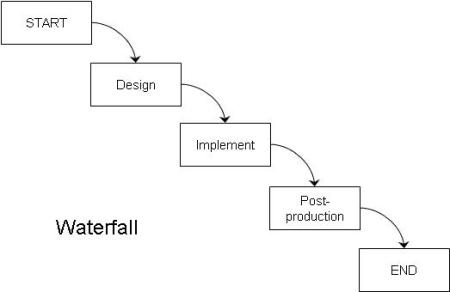Games MDA
MDA stands for "Mechanics", "Dynamics" and "Aesthetics", and are extremely important when designing a game, they are essentially the aspects that make the game "fun". Each of the words of the MDA framework are described as:
Mechanics - Rules of the game.
Dynamics - The play of the game after the rules had been implemented.
Aesthetics - Player experience rather than visual elements of the game.
They are all connected, as you can't have one without the other.
When talking about the gameplay, most people think that the game is either fun or not fun, but what exactly is "fun"? According to the article, there are 8 types of "Fun":
In order to create a good game, a developer should follow the "Waterfall" technique.
Mechanics - Rules of the game.
Dynamics - The play of the game after the rules had been implemented.
Aesthetics - Player experience rather than visual elements of the game.
They are all connected, as you can't have one without the other.
When talking about the gameplay, most people think that the game is either fun or not fun, but what exactly is "fun"? According to the article, there are 8 types of "Fun":
- Sensation - Game as sense pleasure
- Fantasy - Game as make believe
- Narrative Game as drama
- Challenge - Game as obstacle course
- Fellowship - Game as social framework
- Discovery - Game as uncharted territory
- Expression - Game as self-discovery
- Submission - Game as pastime
In order to create a good game, a developer should follow the "Waterfall" technique.
 |
| Source |
But, later on it was found out that, just like water in waterfall, there is no way of actually going back to fix previous mistake, so someone made an iteration of the waterfall idea, making it so that you can actually go back to previous steps and fix any mistakes you have made.
 |
| Source |
- Make an observation. (“My experience in playing/making games has shown me that certain types of mechanics are fun.”)
- Make a hypothesis. (“I think that this particular set of rules I am writing will make a fun game.”)
- Create an experiment to prove or disprove the hypothesis. (“Let’s organize a playtest of this game and see if it is fun or not.”)
- Perform the experiment. (“Let’s play!”)
- Interpret the results of the experiment, forming a new set of observations. Go back to the first step.

Comments
Post a Comment